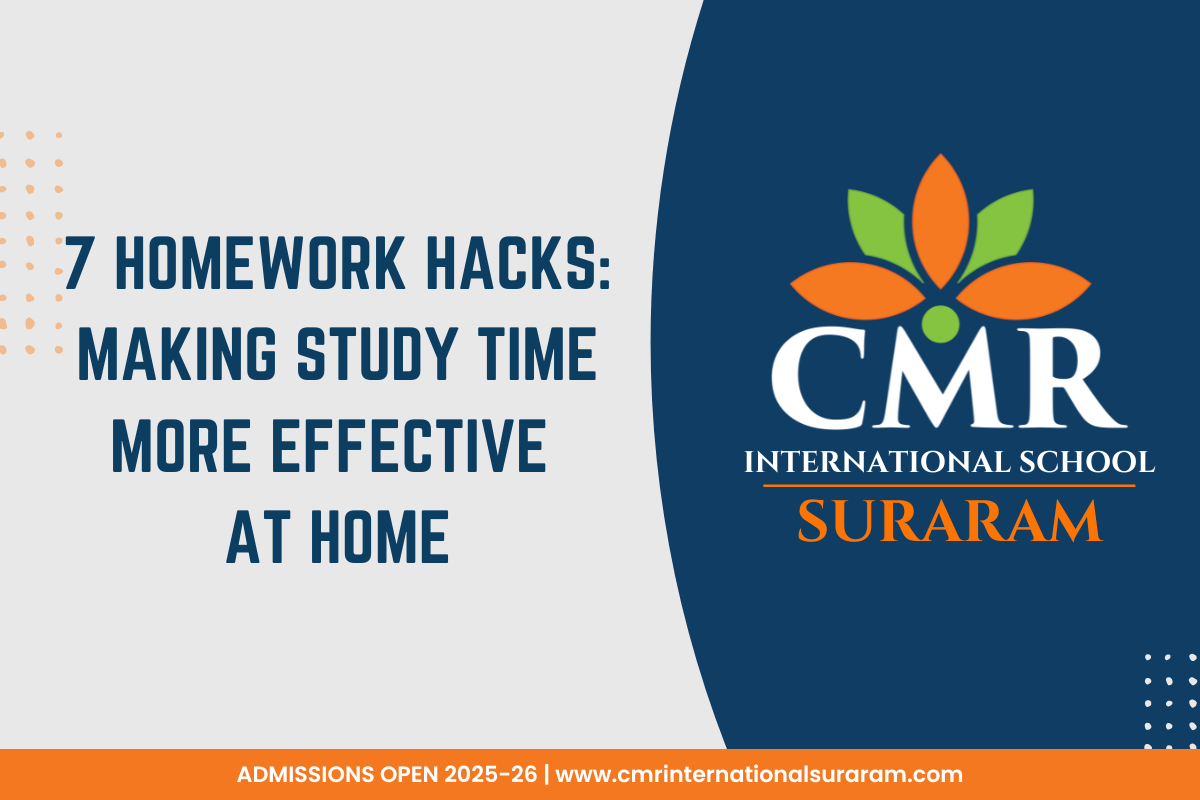Introduction
Let’s face it—homework can feel like a chore. After a long day at school, students often struggle to stay focused and finish assignments efficiently. But what if study time at home didn’t have to be stressful? What if it could be smarter, smoother, and even enjoyable?
At CMR International School, Suraram (CMRIS), we believe that effective learning doesn’t stop at the school gate. With the right strategies and support, students can turn their homework hours into a time of real learning and growth. Here are 7 smart homework hacks that make study time more effective, engaging, and hassle-free.
1. Create a Dedicated Homework Zone
The first step to productive study time is a distraction-free environment. Avoid doing homework on the bed or couch. Instead, create a designated space with:
- A desk and comfortable chair
- Proper lighting
- All necessary supplies (pens, books, calculator, etc.)
- No phones or TV nearby
A clutter-free study area helps students focus better and build a mental association with learning.
2. Set a Specific Homework Schedule
Time management is key. Just like school has periods, homework time should have structure too. Set a regular time every day to study—after a snack, before dinner, or based on what suits your child best.
- Use timers or alarm clocks to set study blocks (e.g., 25-minute sessions with 5-minute breaks).
- Stick to the schedule even if there’s less homework. Use the time for revision or reading.
Regularity trains the brain to be ready for learning at that hour every day.
3. Break Tasks Into Smaller Chunks
Staring at a big homework task can be overwhelming. The secret? Divide and conquer.
- Break homework into smaller, manageable parts.
- Focus on one task at a time.
- Celebrate small wins—checking off tasks boosts motivation.
For example, instead of saying “Do science homework,” say “Complete questions 1–5” first. Baby steps build momentum.
4. Start with the Toughest Subject First
When the brain is fresh, it’s best to tackle the hardest assignments first. Save the easier tasks for later when energy levels are lower.
- If math feels hard, do it first before moving to easier subjects like drawing or reading.
- Completing the tough stuff early gives a confidence boost for the rest of the evening.
At CMRIS, we guide students to prioritize tasks based on difficulty and deadlines.
5. Use Active Learning Techniques
Passive reading or copying answers won’t help much. Encourage active learning by:
- Making mind maps
- Teaching the topic to a parent or sibling
- Writing summary notes
- Using flashcards or voice recordings
The more students interact with the material, the more they remember it.
6. Eliminate Digital Distractions
It’s easy to get lost in screens. So during homework time:
- Keep phones away or on airplane mode
- Turn off social media notifications
- Use study apps like Forest or Pomodoro Timer
- If online research is needed, set clear time limits
At CMRIS, we also teach students digital discipline, so they can use technology wisely—not wastefully.
7. Review and Reflect at the End
Once the homework is done, don’t just shut the books and walk away. Encourage a quick reflection habit:
- Review what was learned
- Note down anything confusing to ask the next day in class
- Pack the school bag for the next day
This small routine builds a habit of self-assessment and responsibility.
Conclusion
Homework doesn’t have to be a headache. With a little planning, the right mindset, and supportive habits, students can master the art of home study. At CMR International School, Suraram, we promote a holistic approach to learning—inside and outside the classroom.
By following these 7 homework hacks, your child can turn homework time into a productive and rewarding part of their academic journey.
FAQs
1. What is the ideal duration for homework for school children?
It depends on age, but generally 30–90 minutes is sufficient. Breaks in between are important to avoid fatigue.
2. My child gets distracted easily. What can I do?
Start with short study sessions, eliminate digital distractions, and use timers to build focus gradually.
3. Is it okay to help my child with their homework?
Yes—but guide, don’t do it for them. Ask questions, provide hints, and let them reach the answers independently.
4. How can I motivate my child to finish homework?
Use encouragement, praise effort, create a reward system for consistency, and celebrate small achievements.
5. Does CMRIS support students who struggle with homework?
Absolutely! Our teachers offer personalized guidance, doubt-clearing sessions, and homework support when needed.



